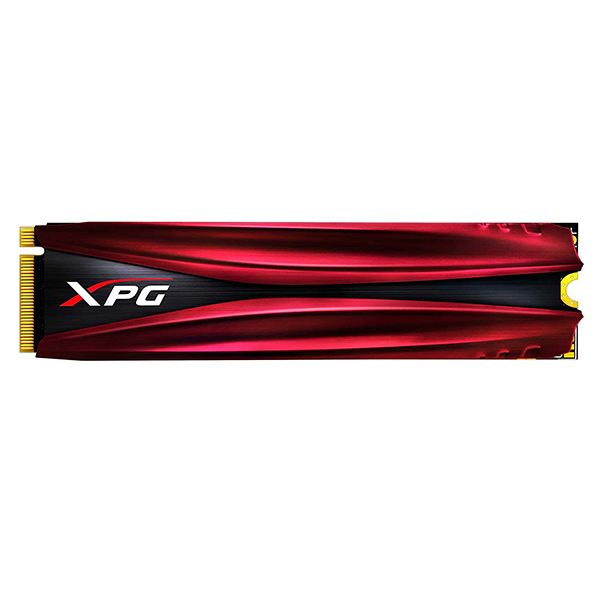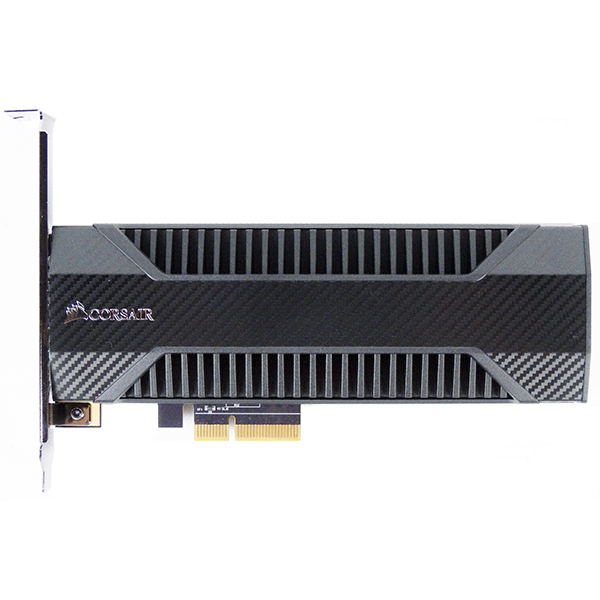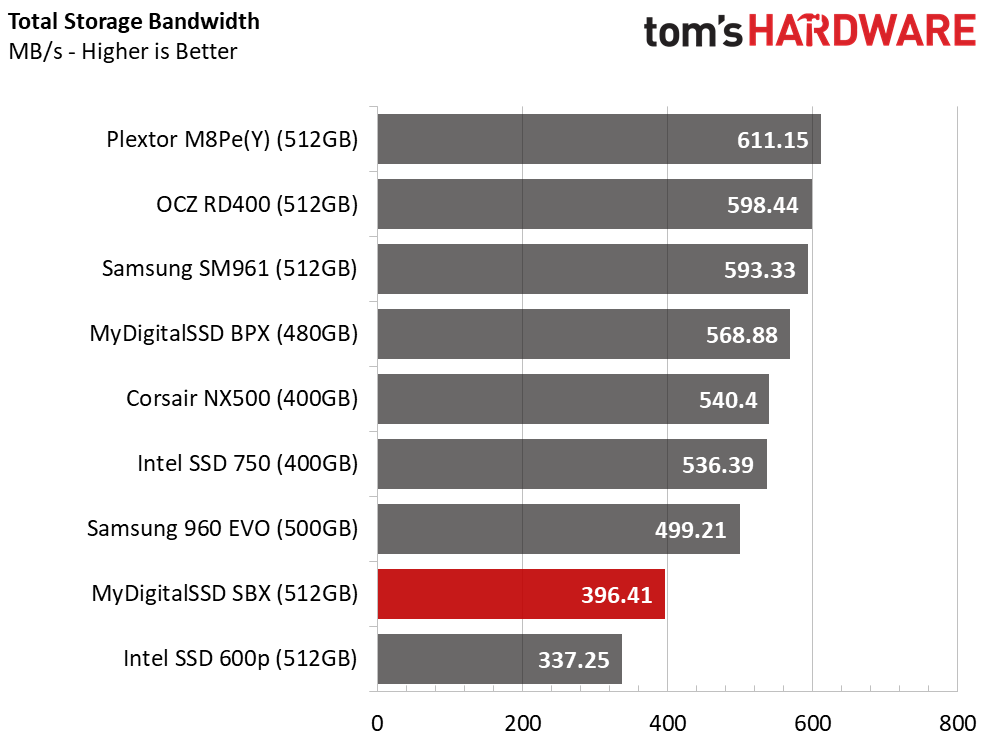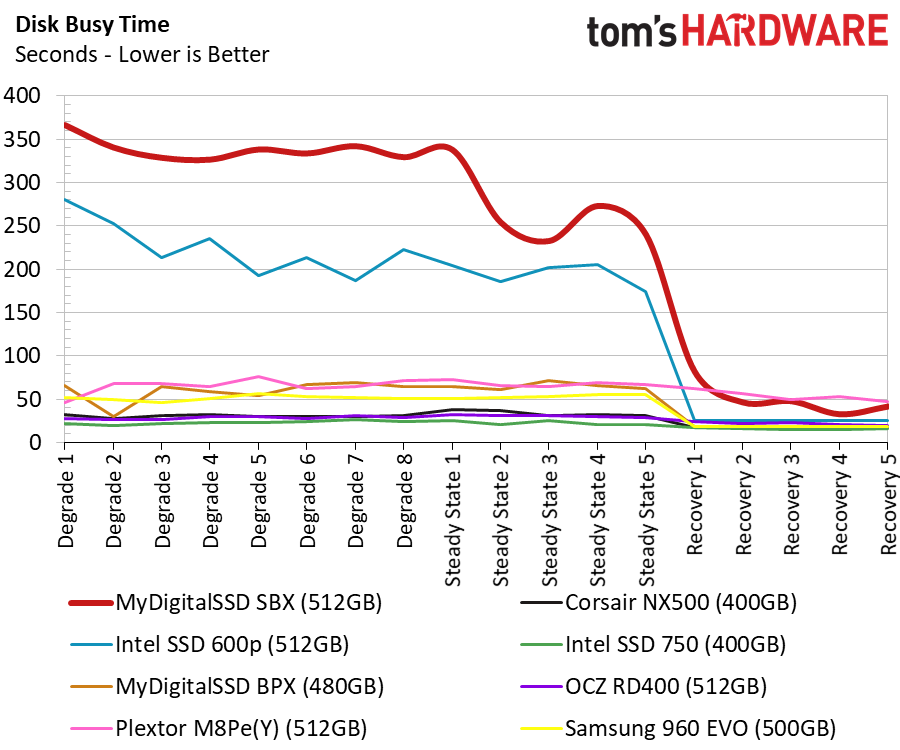MyDigitalSSD SBX NVMe SSD Review
Why you can trust Tom's Hardware
512GB Benchmark Results
Comparison Products
There are more 512GB-class NVMe SSDs on the market than 1TB (and larger) drives. Many of these products came to market during the NAND shortage. The shortage increased prices, and in some cases, NVMe products cost $1 per gigabyte. Consumers simply don't purchase $1,000 SSDs, even if they ship in an Intel box. High capacity NAND packages were diverted to the enterprise market where companies can charge an even larger premium. That left end users like us with 512GB M.2 drives that cost more than SATA SSDs despite the obvious cost advantages from the reduced cost of components, like the aluminum case that M.2 products don't use.
In this capacity class, we finally get to see the MyDigitalSSD SBX against the BPX, which was the best value SSD in 2017. The Intel 600p, Samsung PM961, Adata S10 GAMMIX, Corsair Neutron MX500, Plextor M8Pe, and Toshiba RD400 appear in this group. These models have earned various levels of success throughout the year based on sale pricing and availability.
Sequential Read Performance
To read about our storage tests in-depth, please check out How We Test HDDs And SSDs. We cover four-corner testing on page six of our How We Test guide.
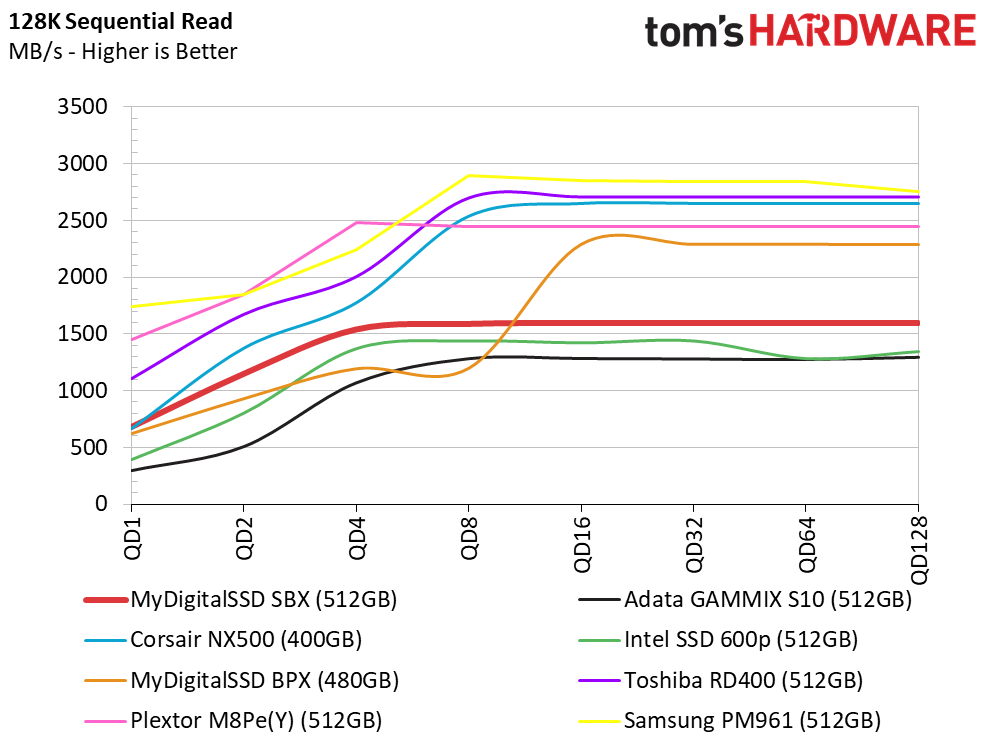
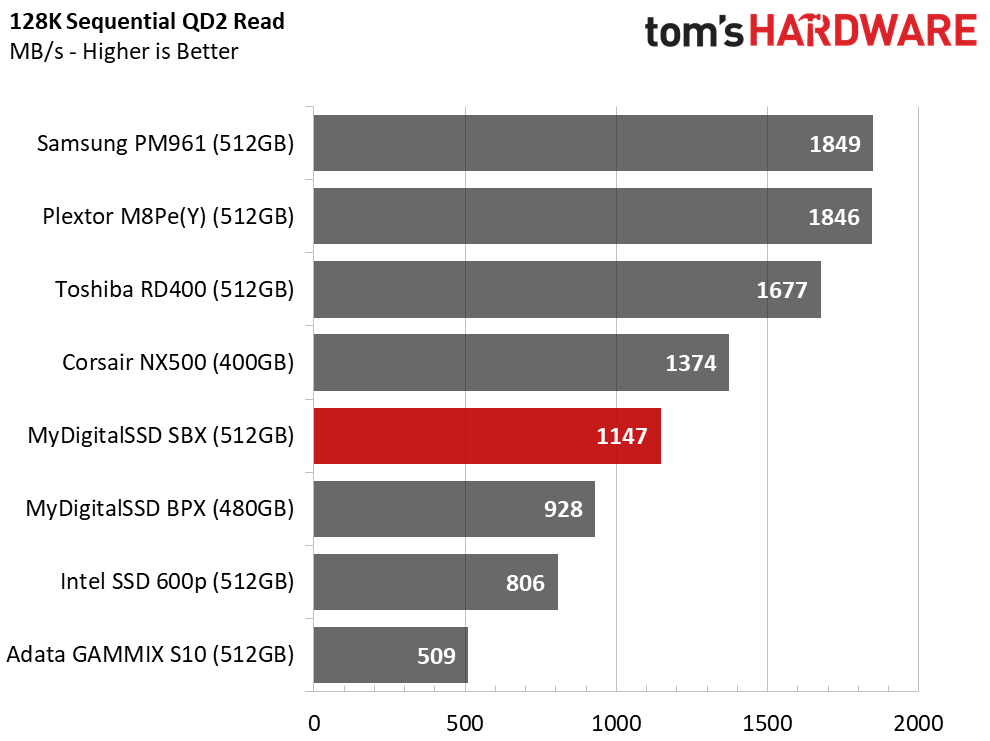
The MyDigitalSSD SBX has to look even better to stand out in this congested capacity class. The drive reaches its peak 1,600 MB/s at QD4 and delivers ~600 MB/s at QD1. The drive outperforms the Intel 600p and Adata GAMMIX at every queue depth we tested.
Sequential Write Performance
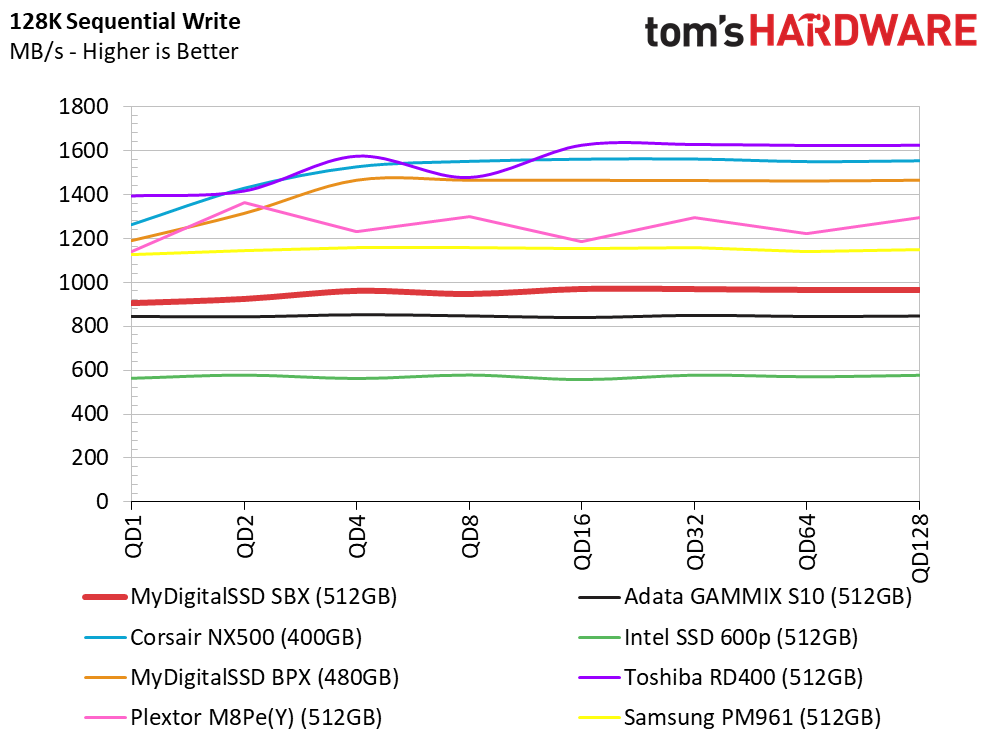
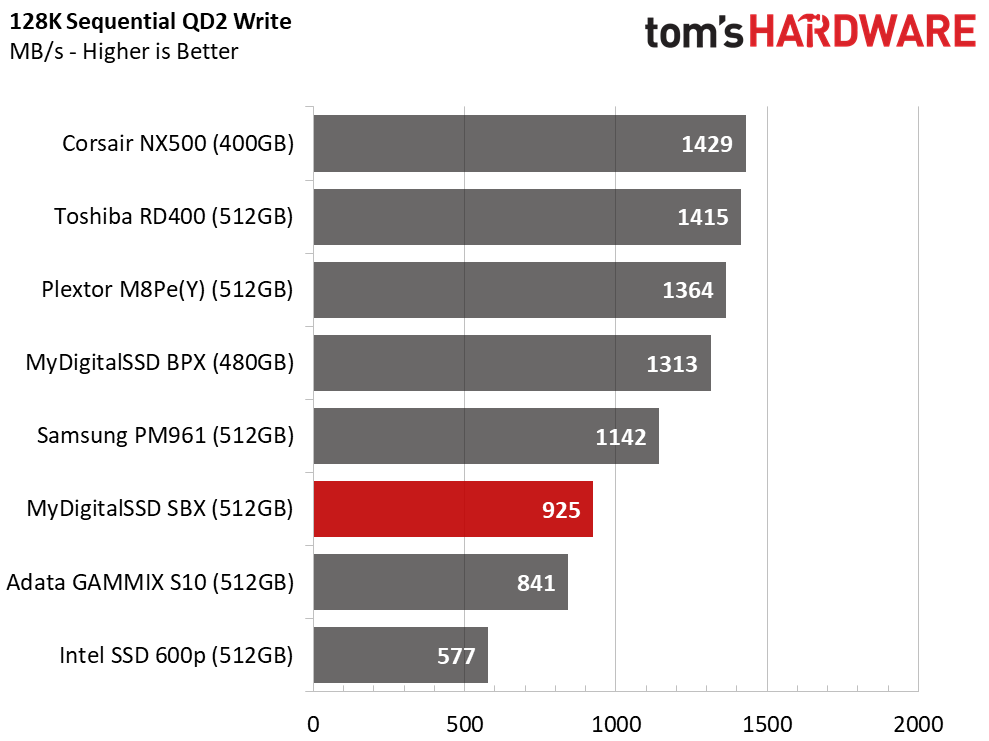
The SBX delivers between 900 and 1,000 MB/s of throughput across the queue depth range with a single worker generating the workload. This is much higher than the Intel 600p, but just a little better than the Adata drive.
Random Read Performance
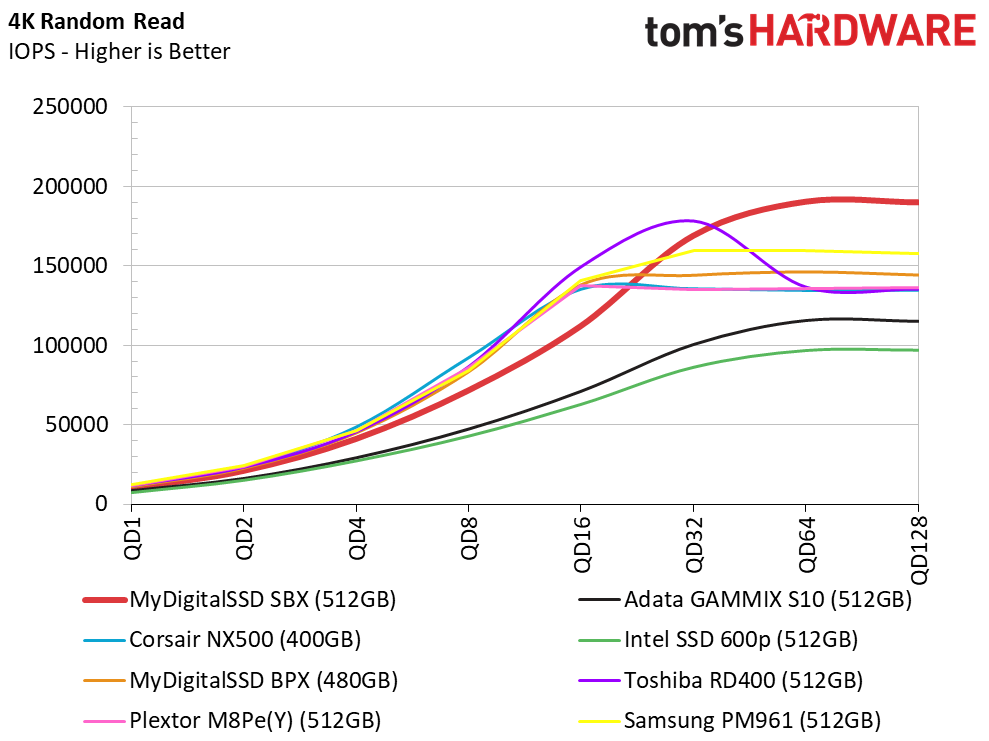
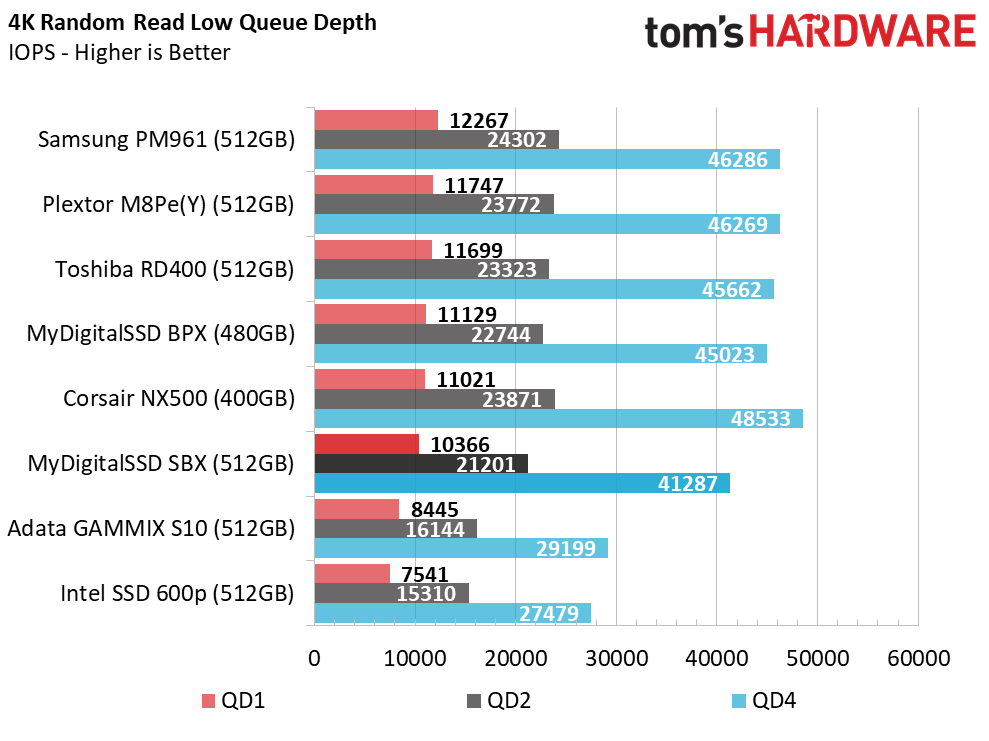
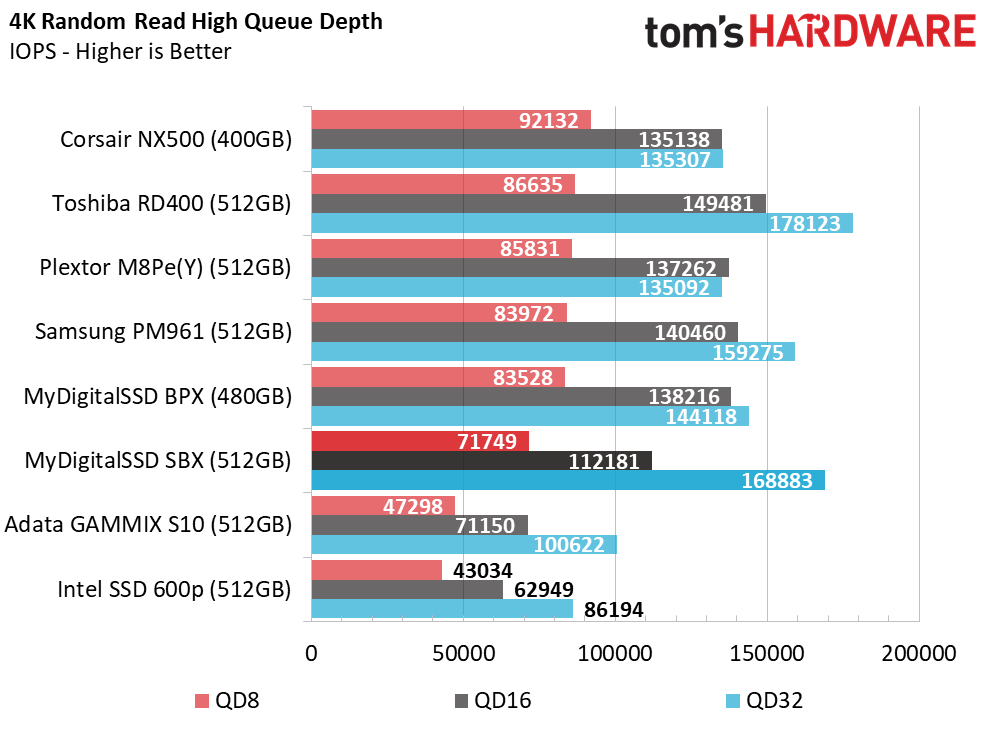
We use the 10,000 random read IOPS mark as the dividing line between good and poor performance. The user experience in Windows is closely tied to the QD1 results. MyDigitalSSD reached the mark but didn't hit it out of the park. We've tested drives that achieve nearly 16,000 IOPS at QD1, so there is still a large divide between the best performance and "acceptable."
Random Write Performance
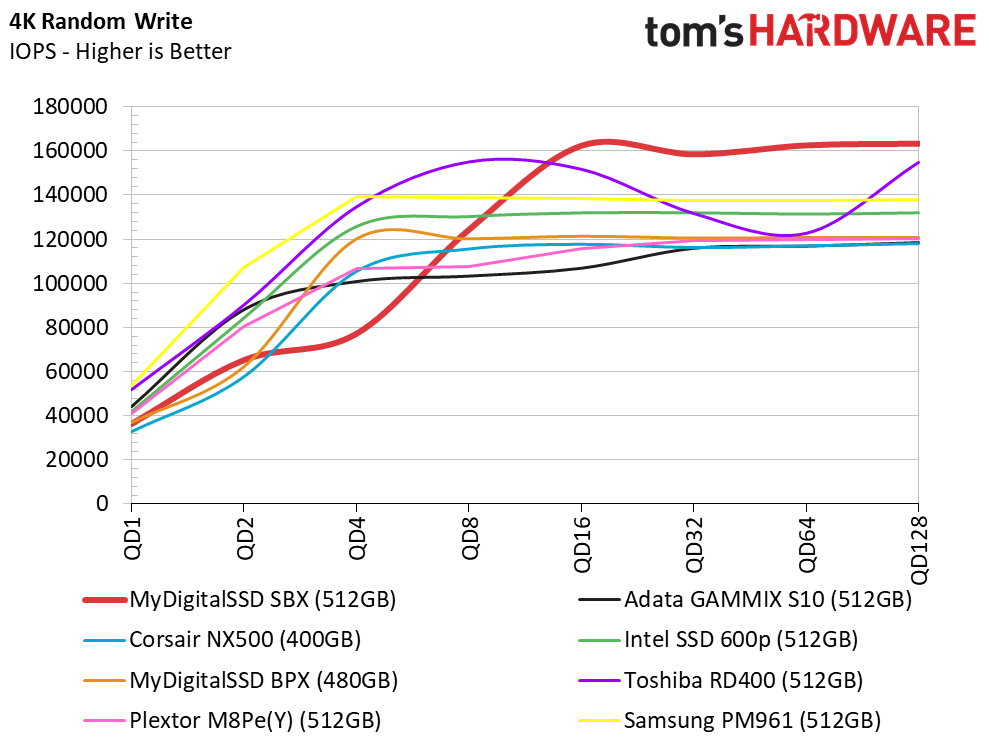
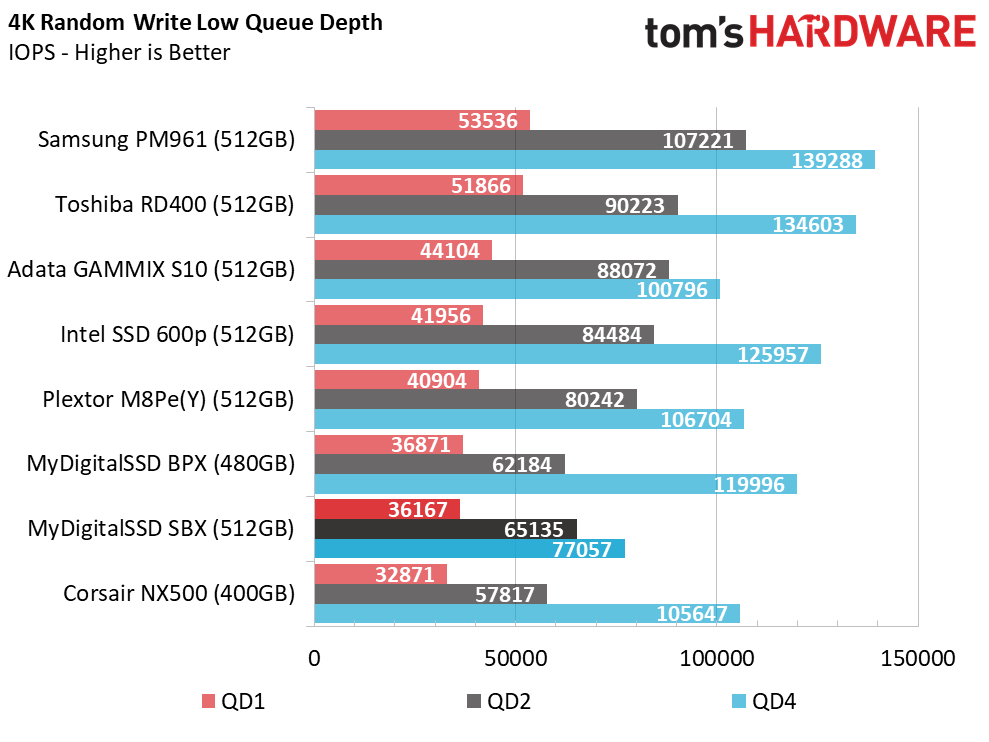
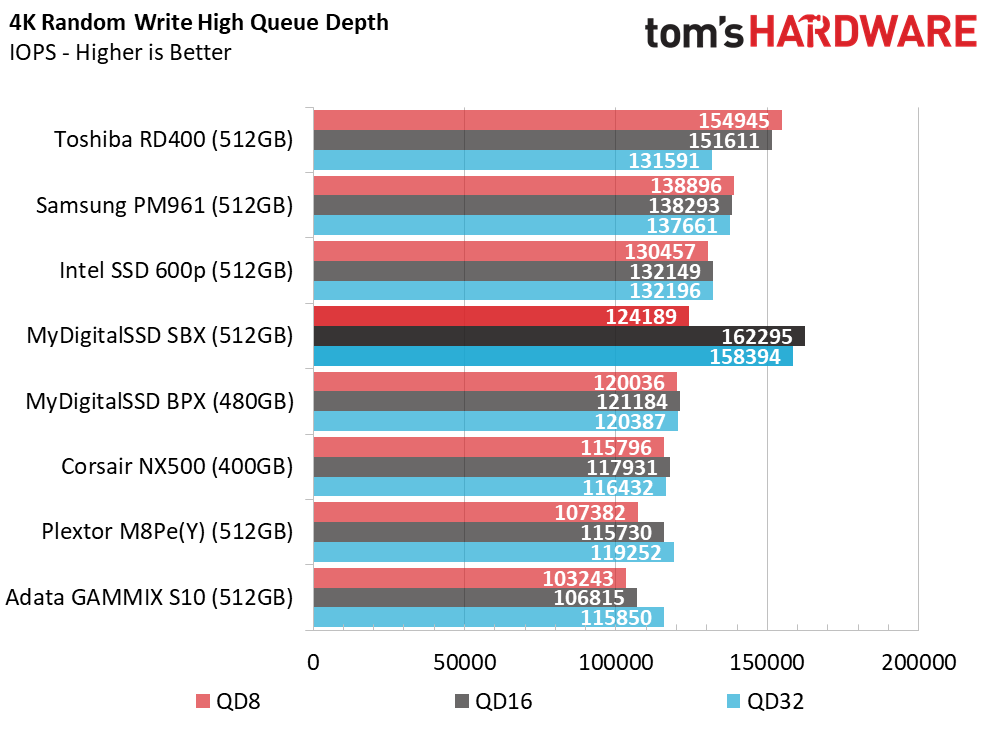
The Intel 600p enjoys a big random write performance advantage over the SBX at low queue depths. This shouldn't be a big concern because the applications and the operating system tend to hold back performance in these types of applications.
Get Tom's Hardware's best news and in-depth reviews, straight to your inbox.
70% Mixed Sequential Workload
We describe our mixed workload testing in detail here and describe our steady state tests here.
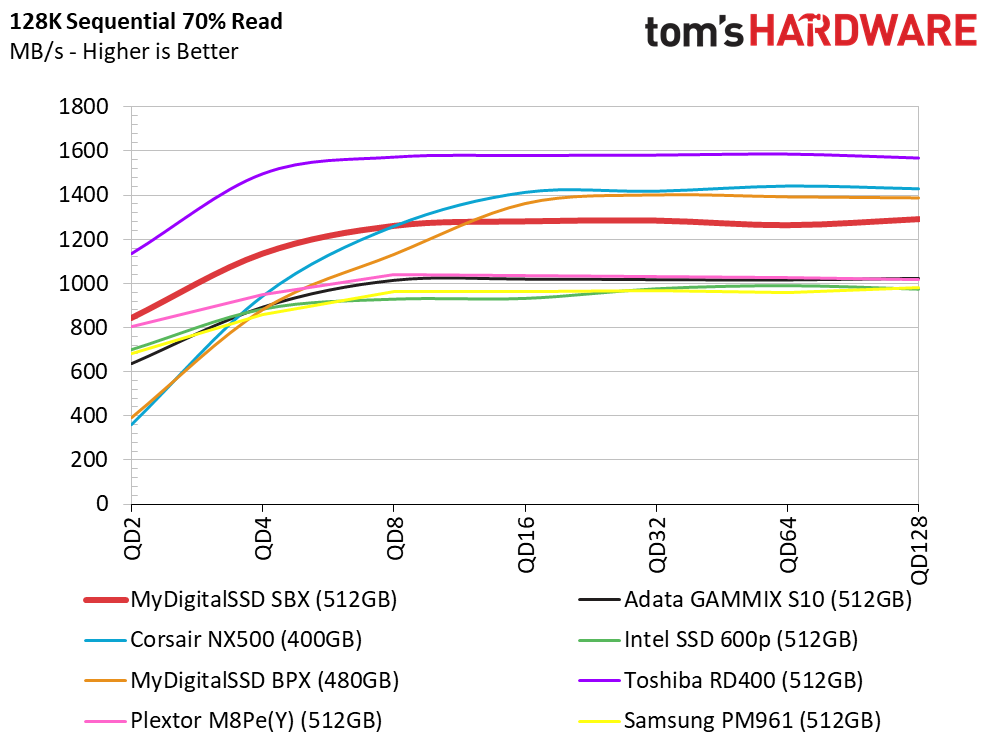
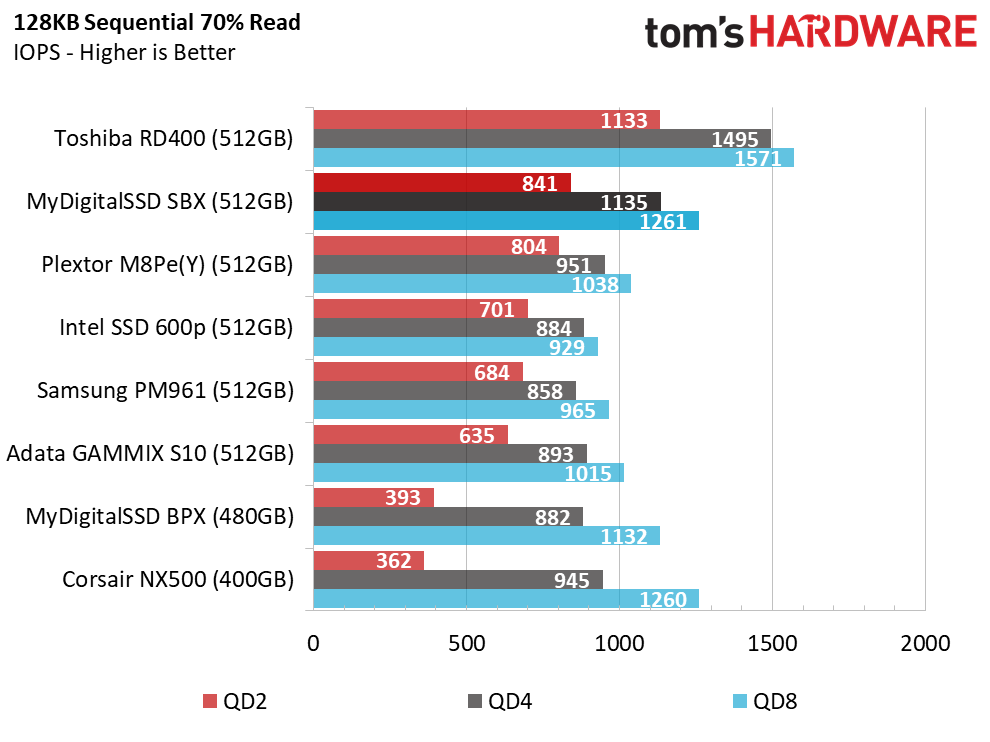
BiCS flash has exceptional performance in mixed workloads, so the SBX accelerates past many of the other products. Most data transfers to and from external drives, high-performance NAS, or other storage devices, consists of large sequential file transfers. The SBX should excel in that type of workload.
70% Mixed Random Workload
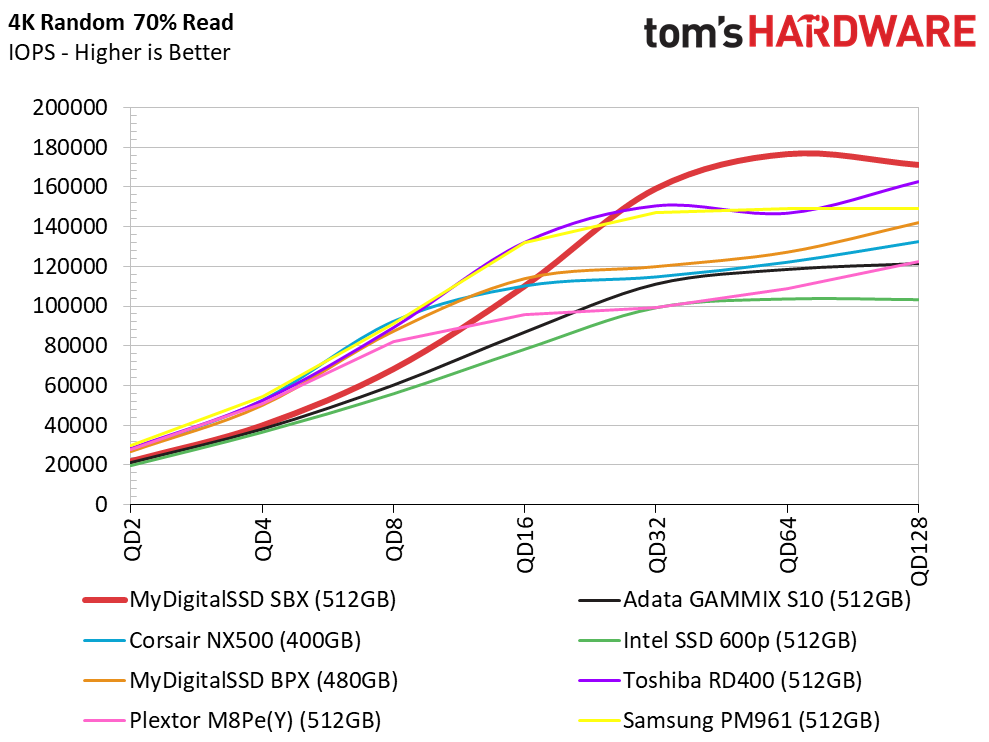
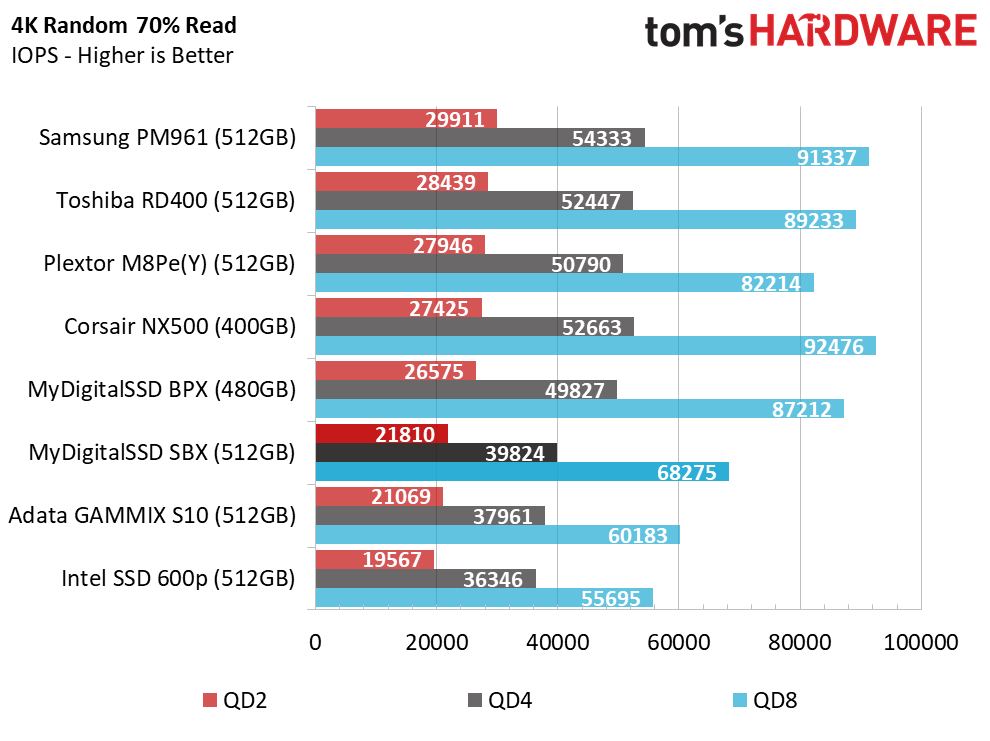
The low random write performance slows the SBX during mixed random workloads at low queue depths.
Sequential Steady-State
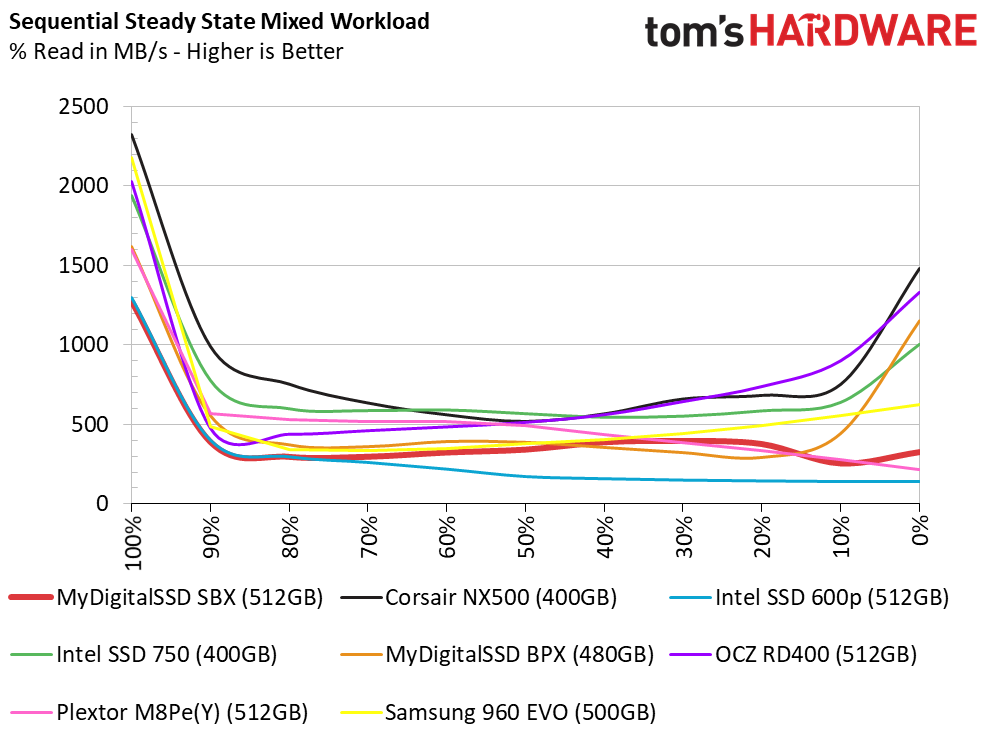
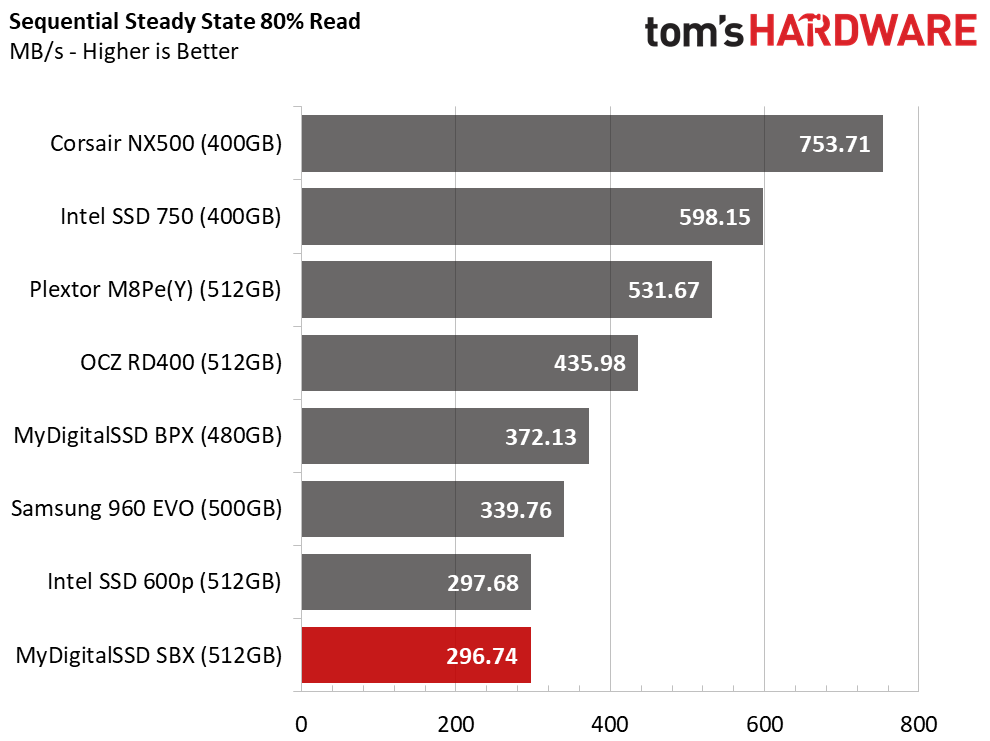
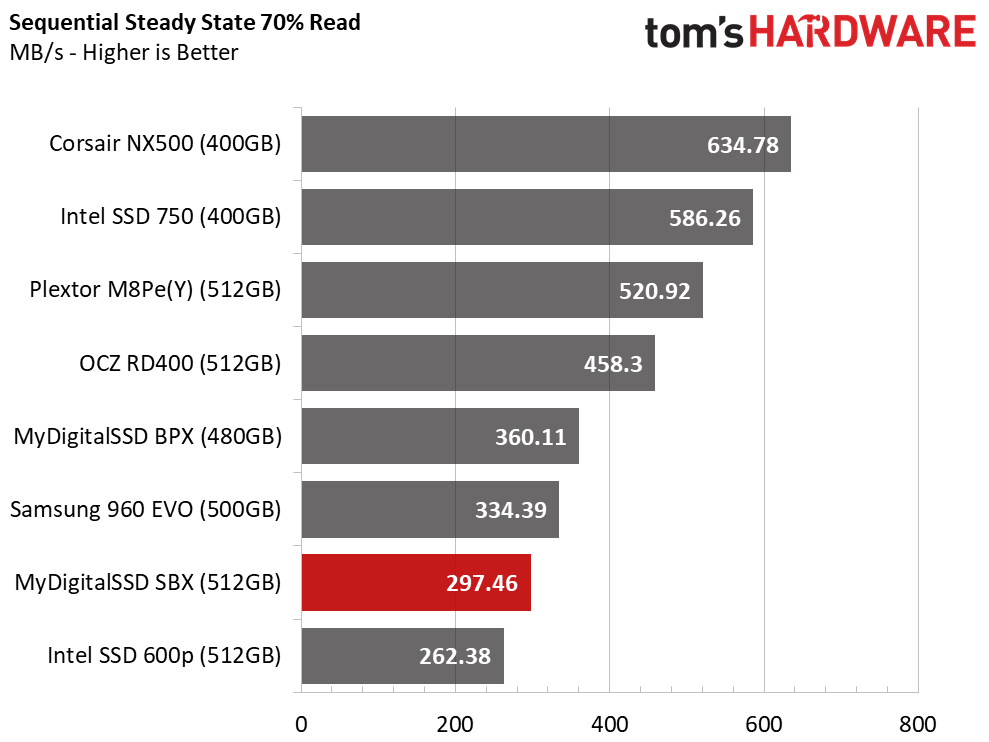
The SBX, like most modern value SSDs, isn't satisfactory for heavy workstation-class workloads. Intel's Optane 900P came to market at just the right time. SSD vendors will need a generation or two with 3D TLC to master developing high-performance drives that still achieve exceptional results during heavy sustained workloads.
Random Steady-State
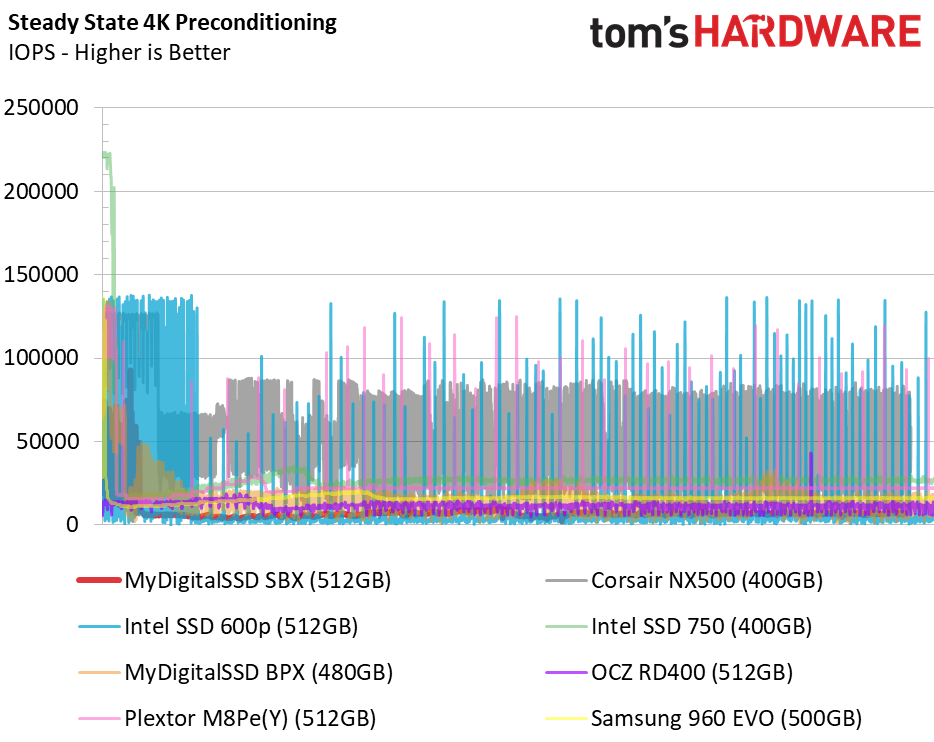
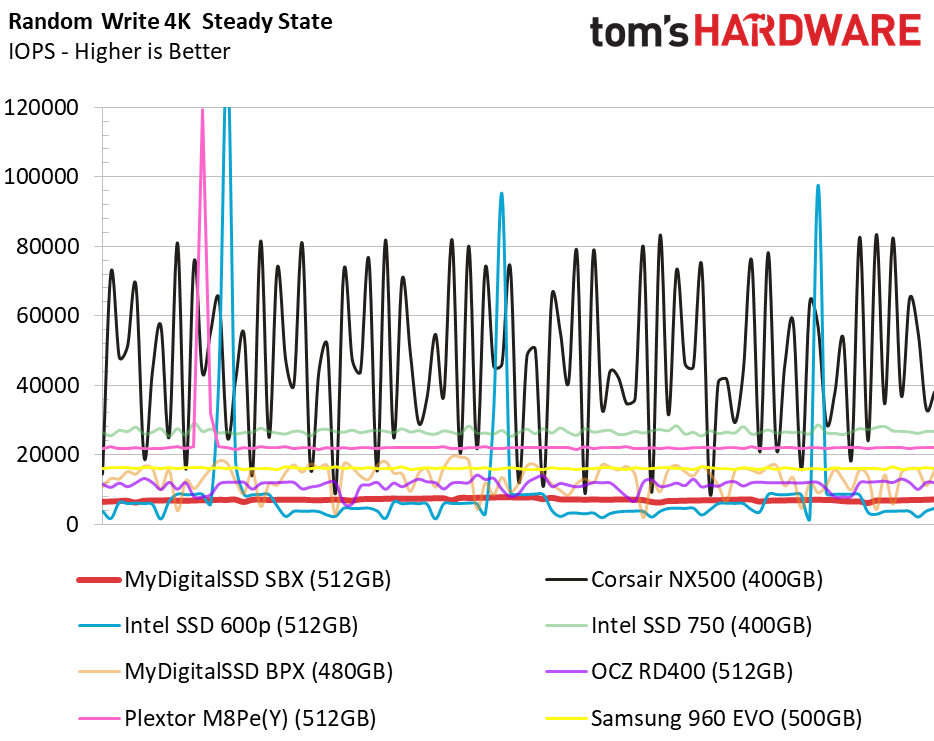
Compared to the larger 1TB model, the 512GB SBX loses close to half of its steady-state random write performance. The SBX SSDs don't use over-provisioning to improve steady-state performance. Instead, the design trades off some performance for more usable capacity. We recommend that you format the drives with some spare area or avoid filling the drives to extreme levels.
PCMark 8 Real-World Software Performance
For details on our real-world software performance testing, please click here.
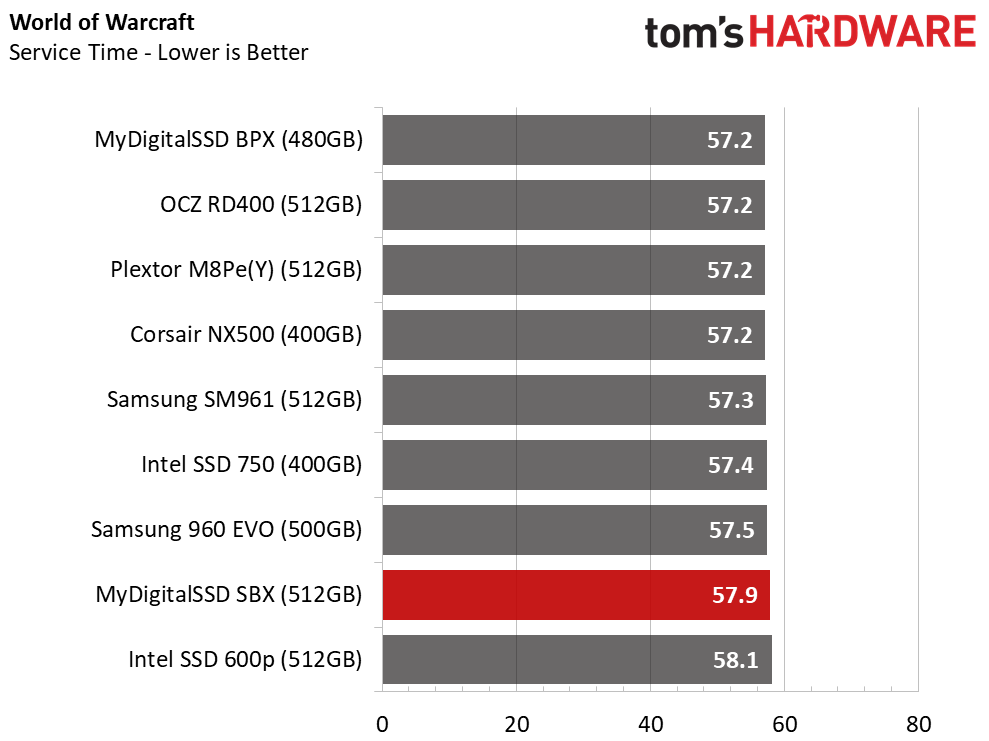
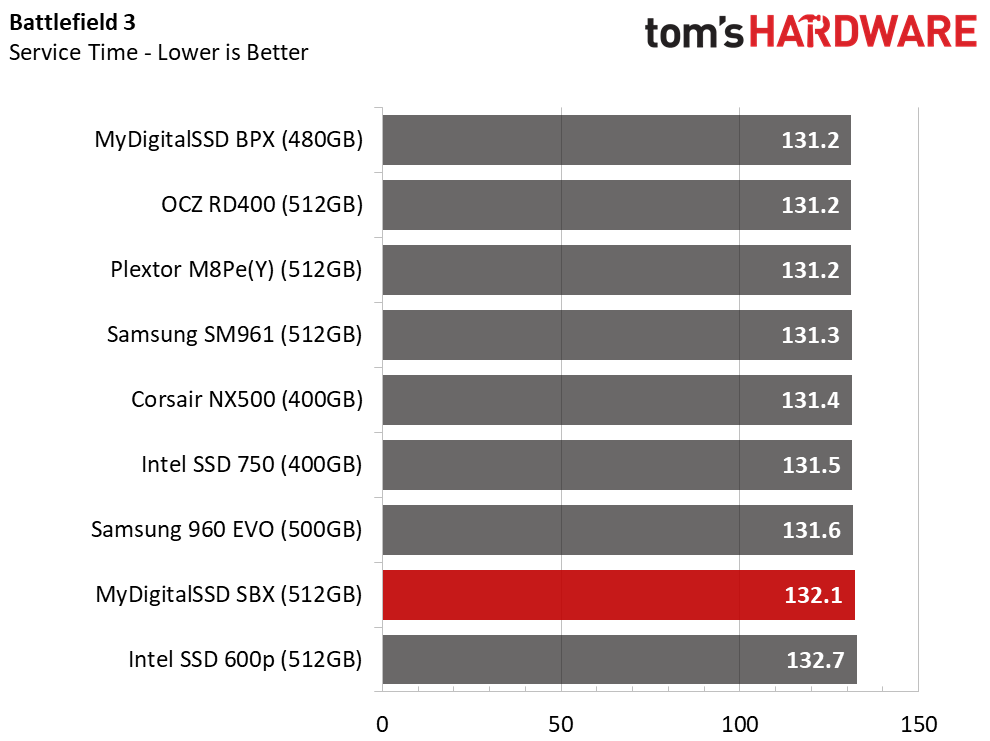
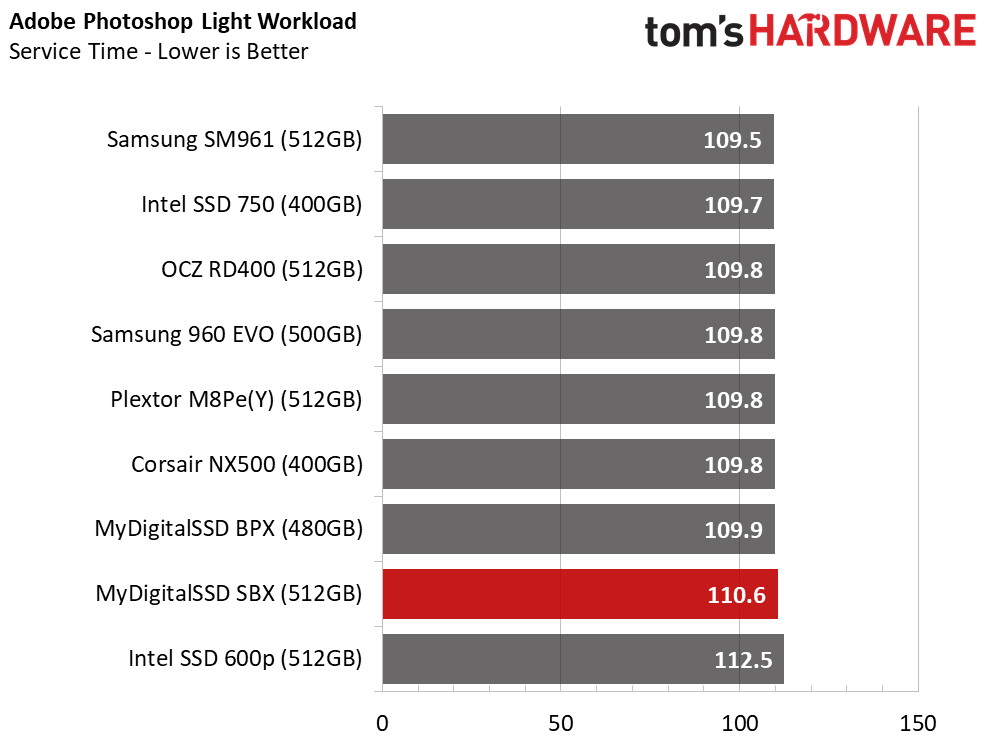
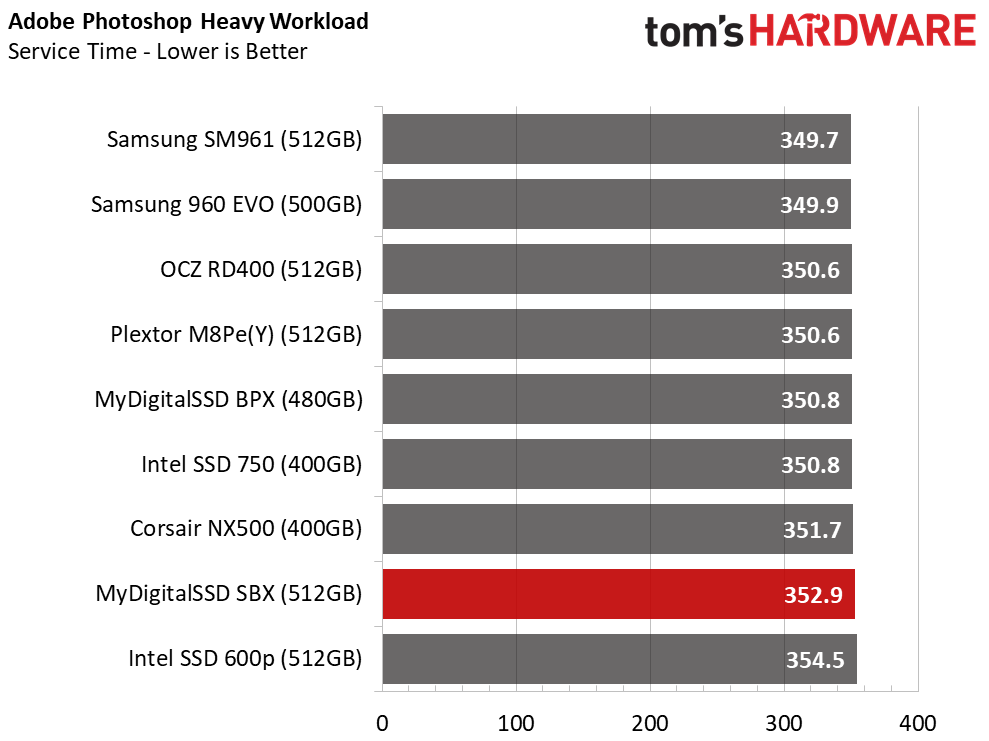
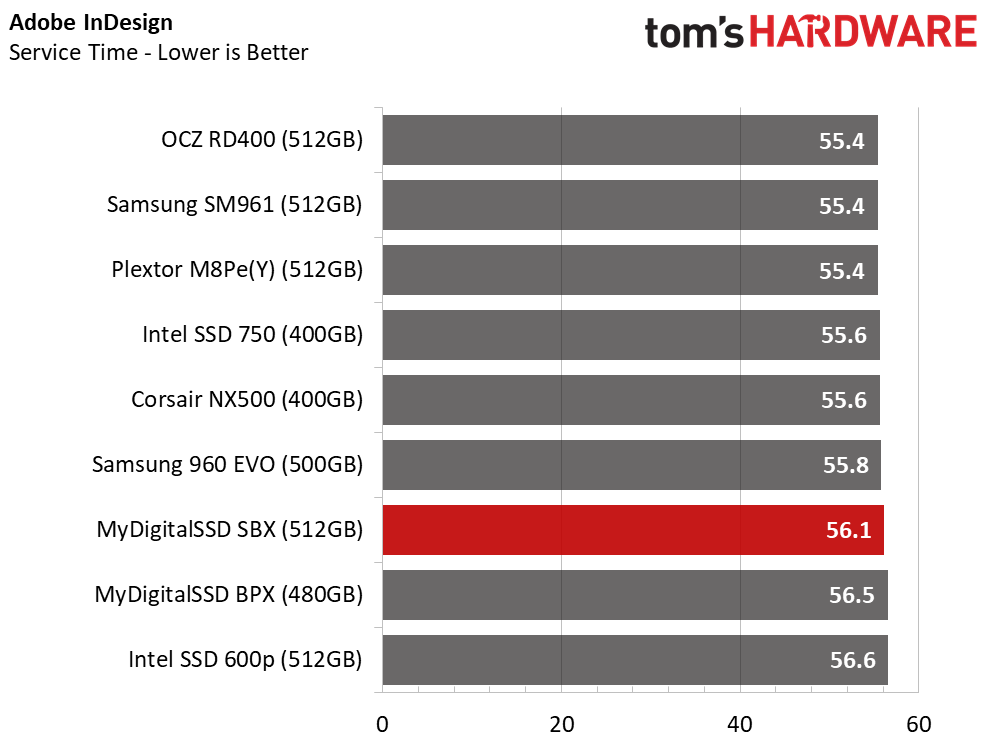

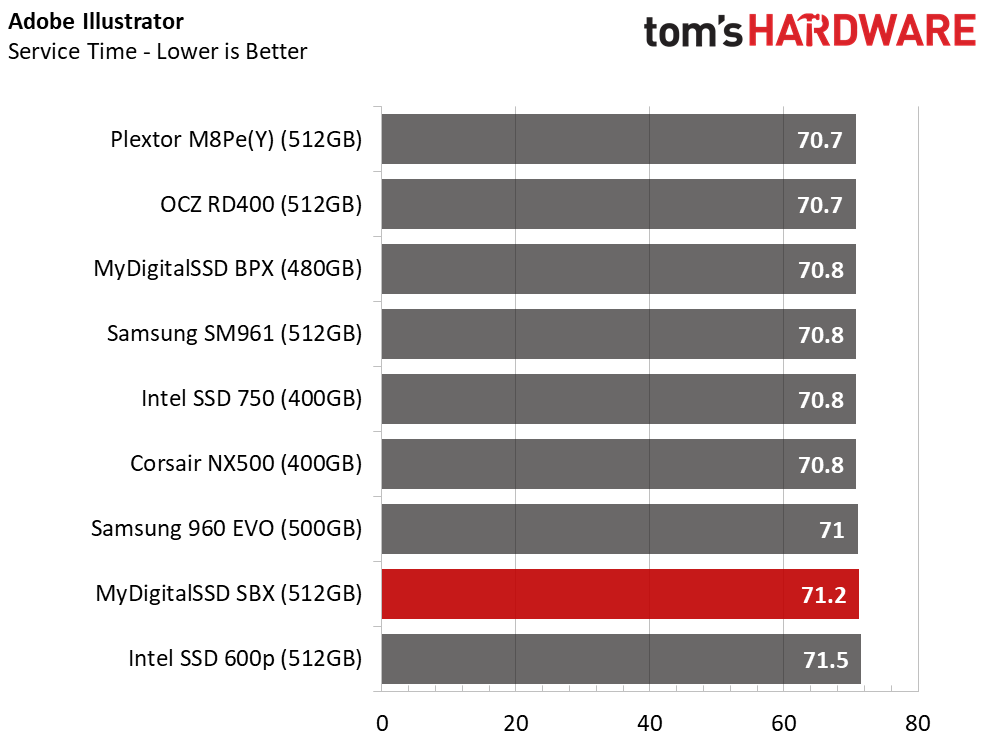
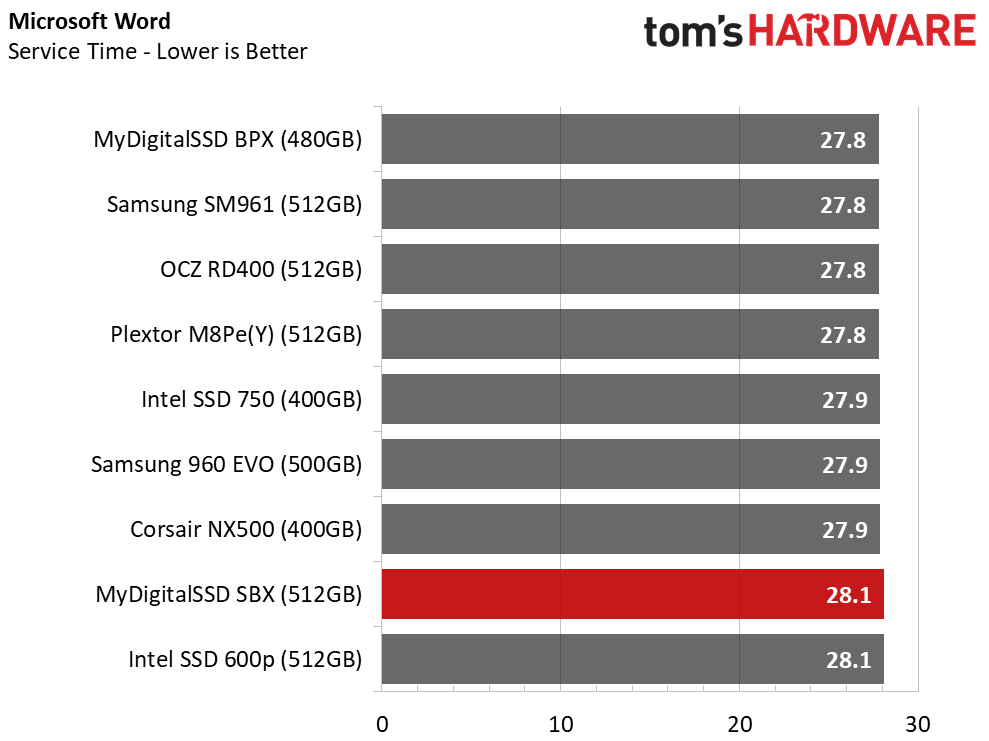
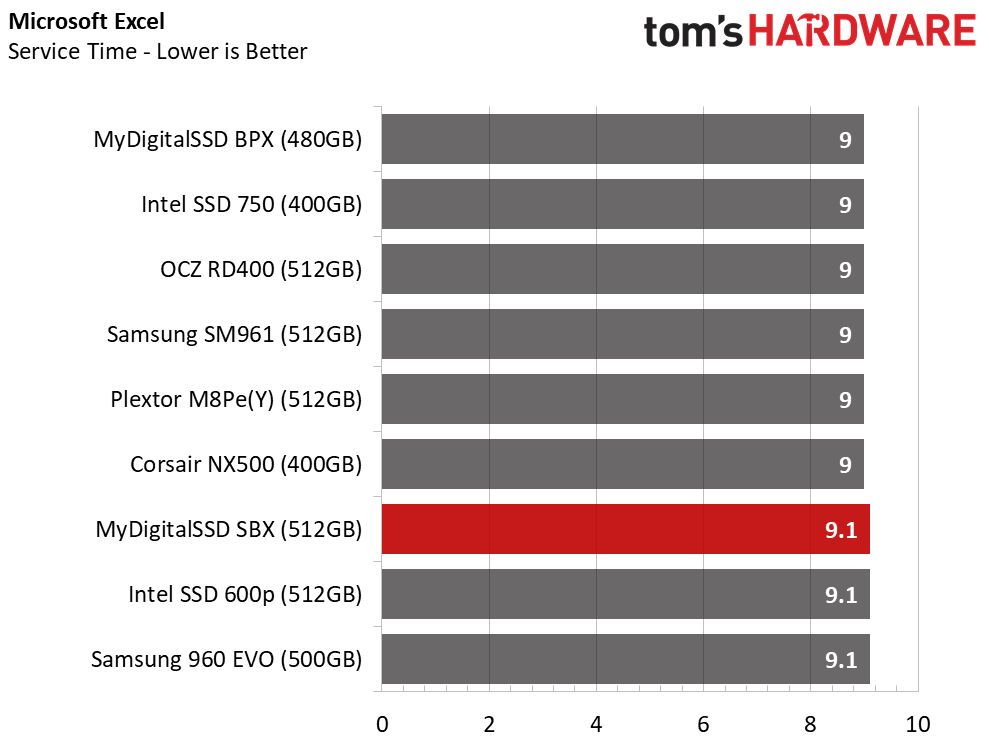
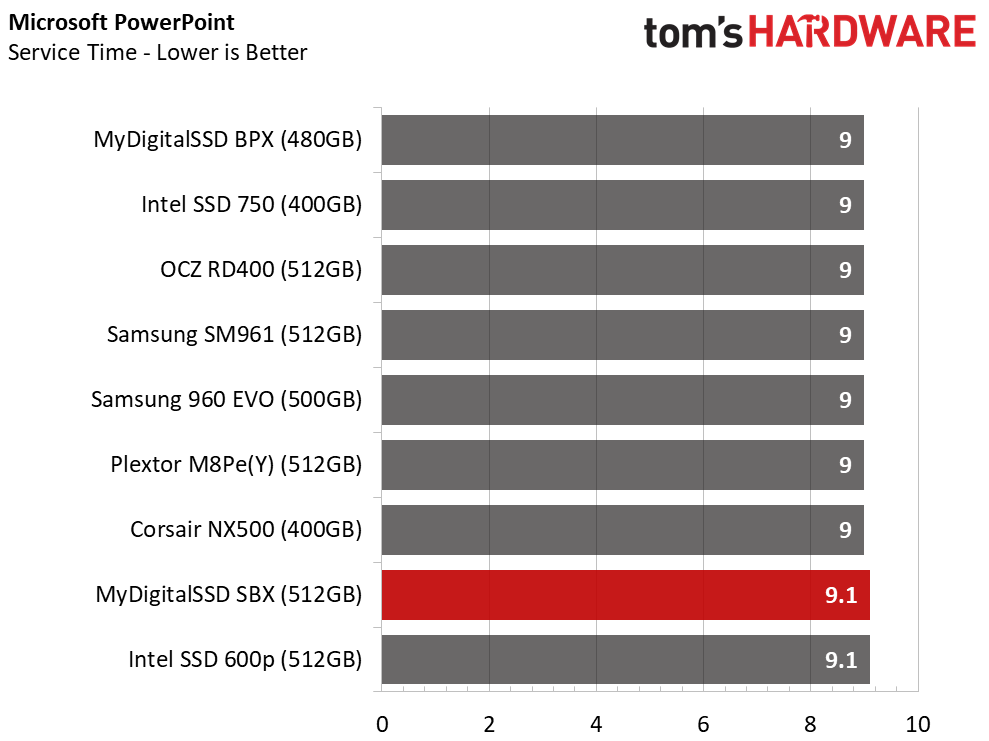
The MLC-powered BPX takes the top of the chart while the SBX hovers near the bottom. The SBX is still faster than the Intel 600p with common desktop applications.
Application Storage Bandwidth
The 512GB SBX scores nearly 400 MB/s of throughput in our test. That's nearly 30 MB/s less than the 1TB SBX.
PCMark 8 Advanced Workload Performance
To learn how we test advanced workload performance, please click here.
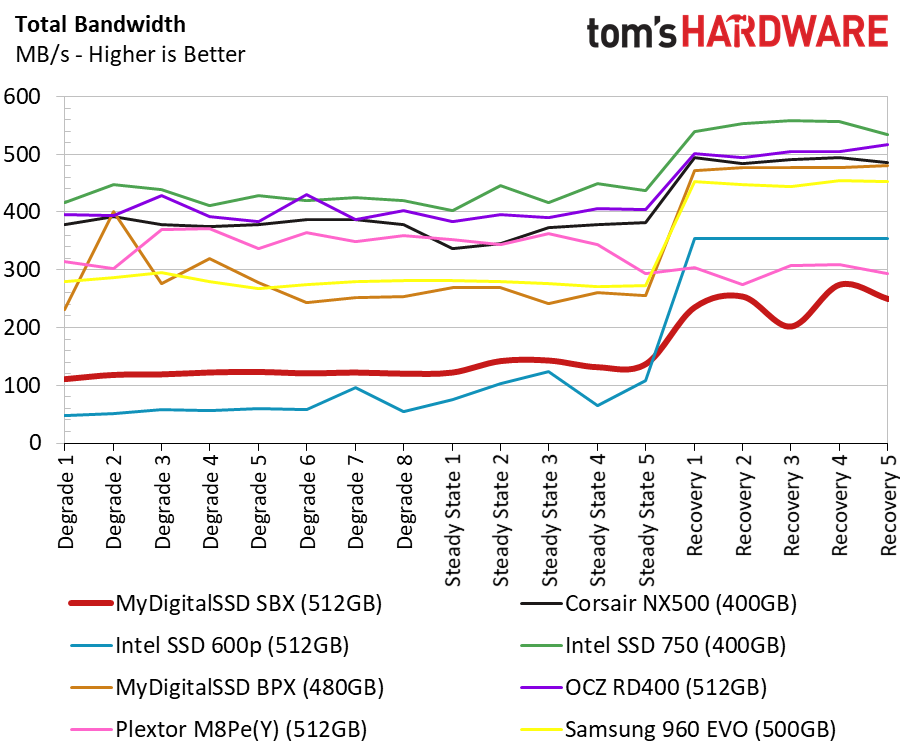
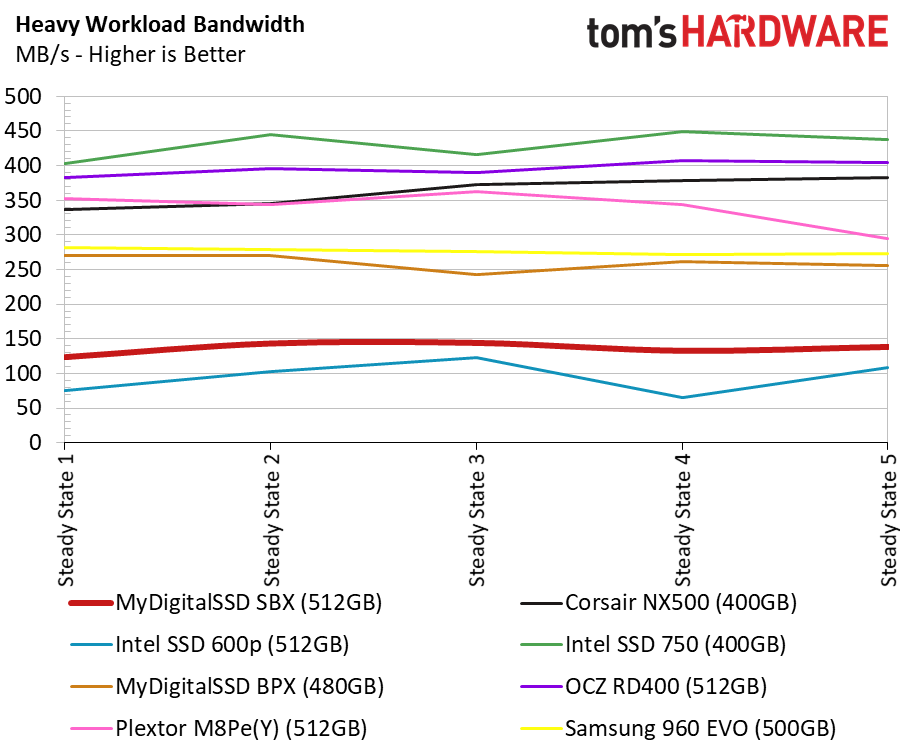
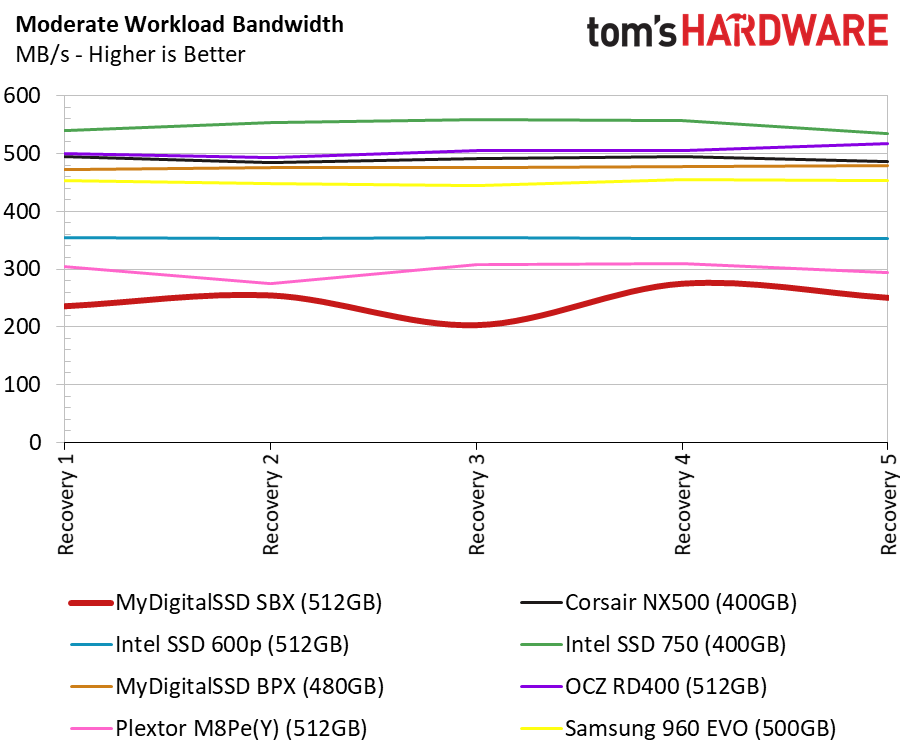
The 512GB SBX's reduced capacity impacts the amount of time the SSD needs to recover after a heavy workload. The SBX would benefit from overprovisioning, which would deliver a significant improvement in this test.
Total Service Time
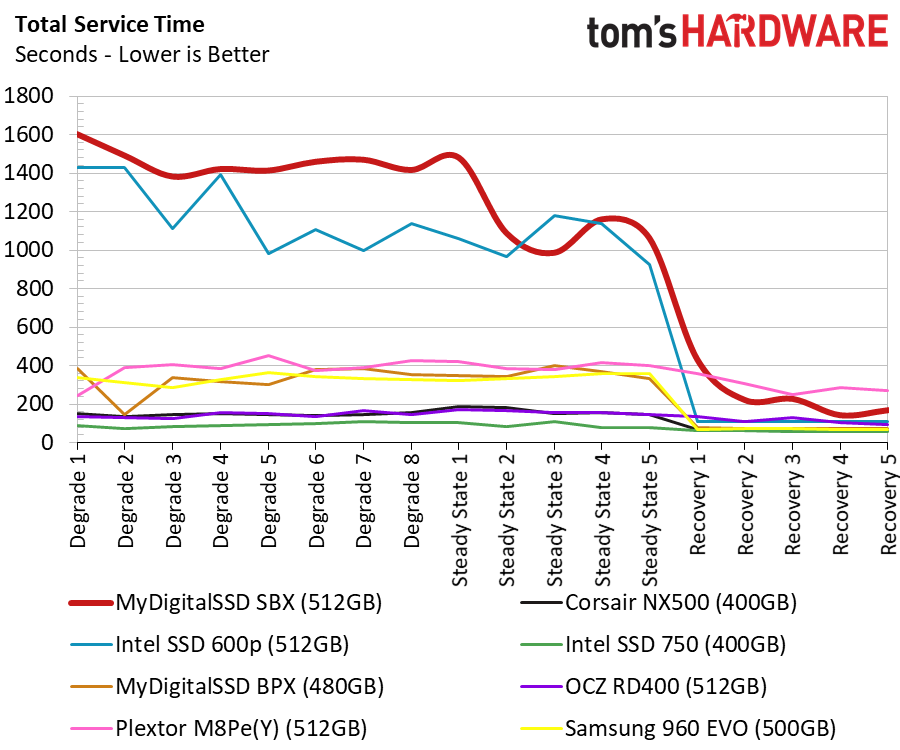
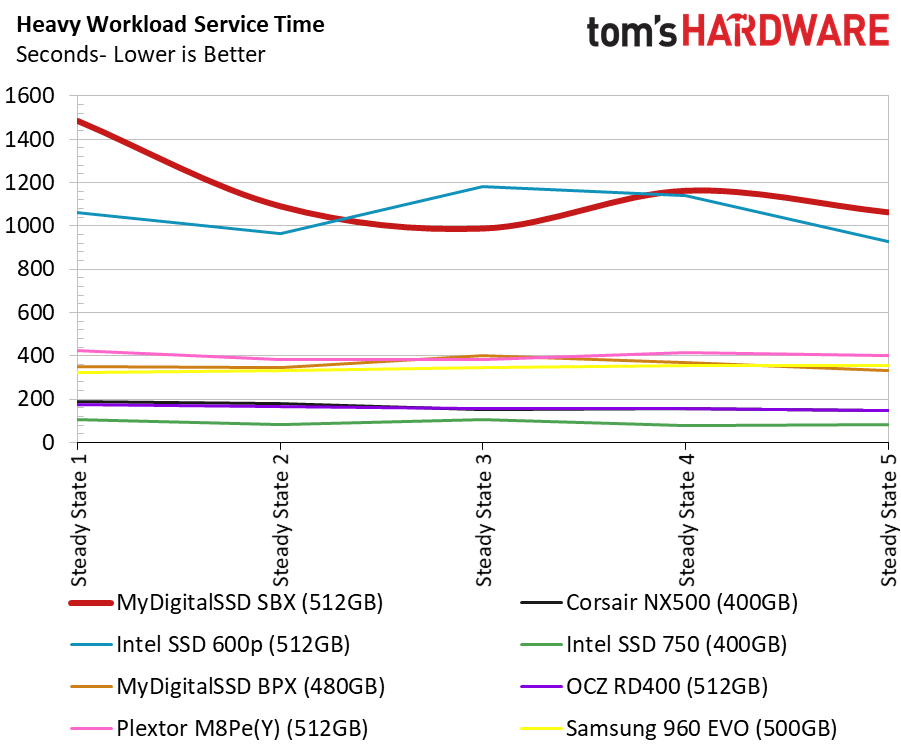
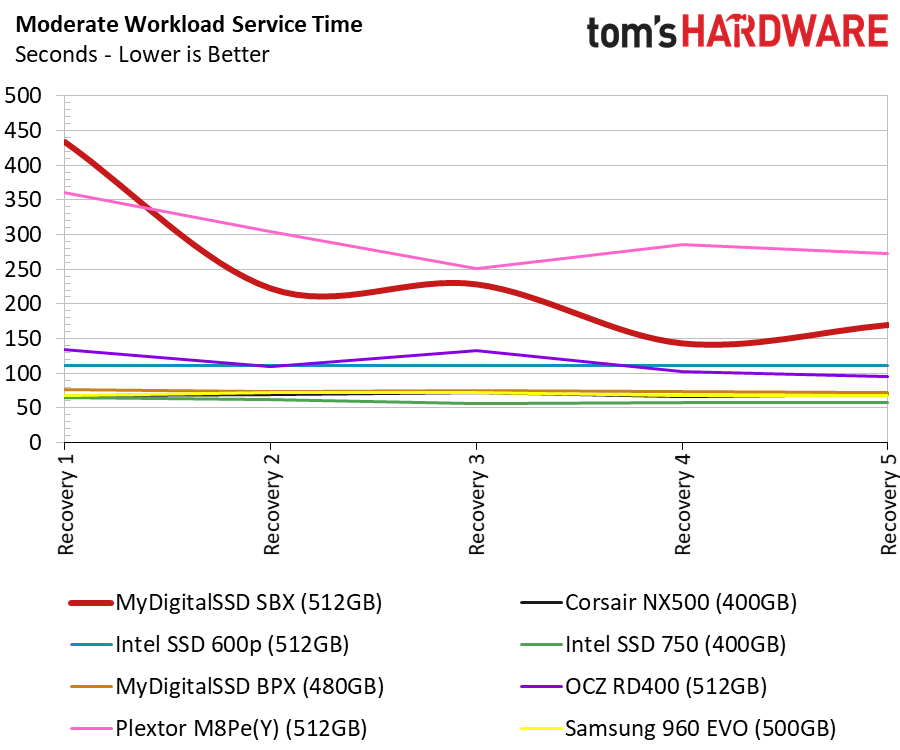
The service time tests reveal that there are other factors beyond heavy background activity that lead to increased latency with the foreground workload. MyDigitalSSD and Phison will more than likely work on a firmware update to address the high latency we observed with this model.
Disk Busy Time
The disk busy time test shows us there is an issue with this capacity during heavy workloads.
BAPCo SYSmark 2014 SE Responsiveness Test
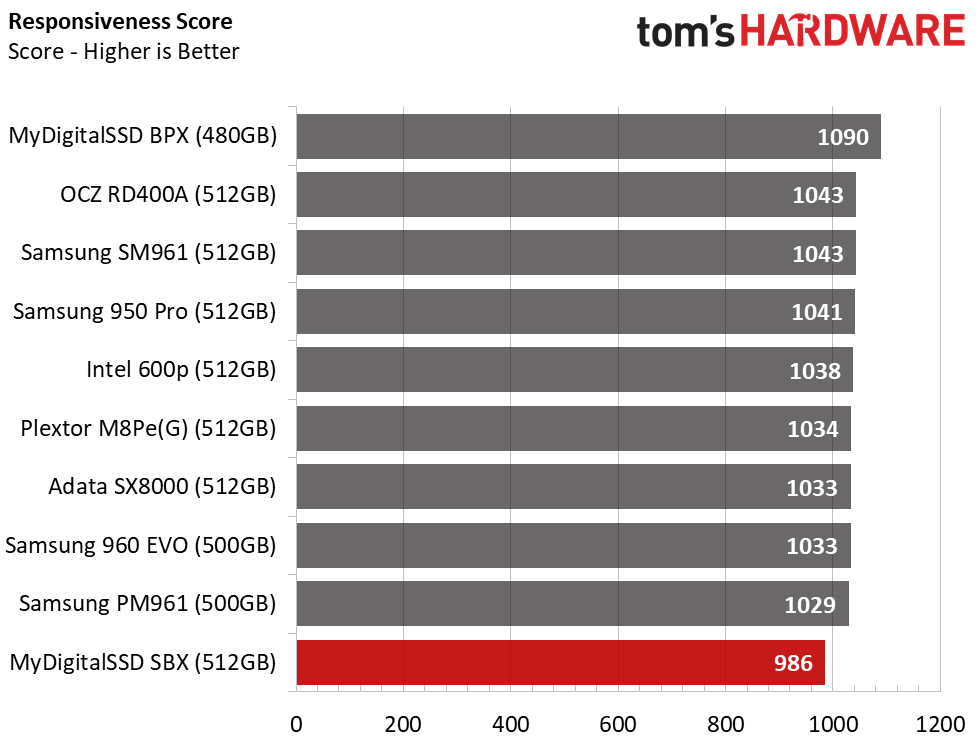
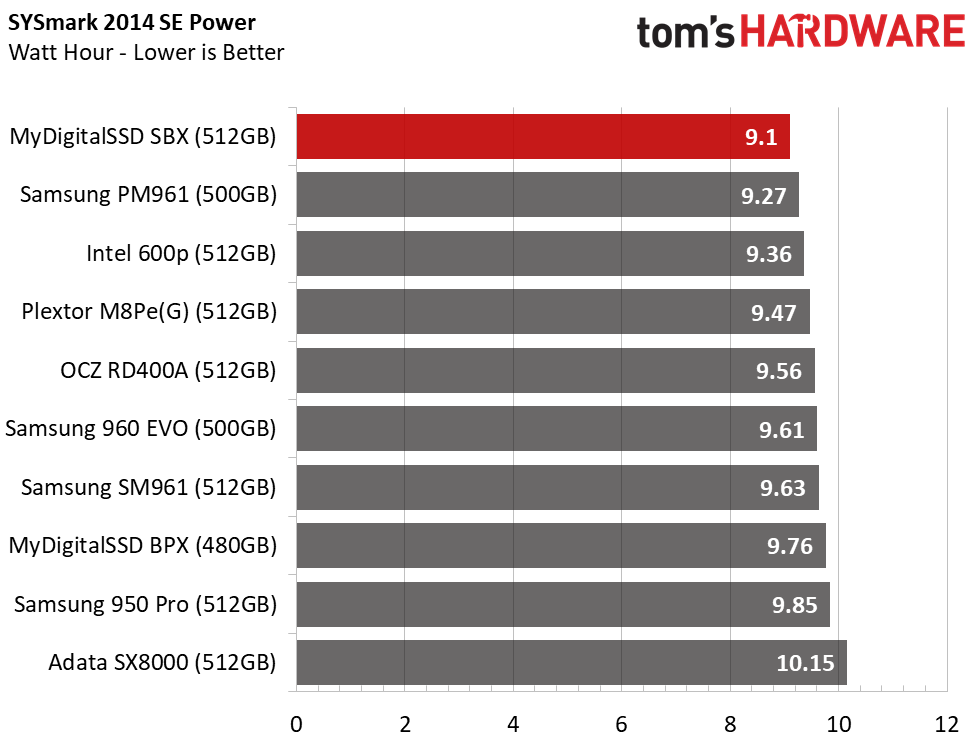
The 512GB SBX is as responsive as the 1TB model during typical consumer workloads. We observed a very slight reduction in power consumption with half of the NAND die. The 512GB model still uses the same number of NAND packages, so the reduced die count is unlikely to have a meaningful impact on power consumption.
BAPCo MobileMark 2012.5 Notebook Battery Life
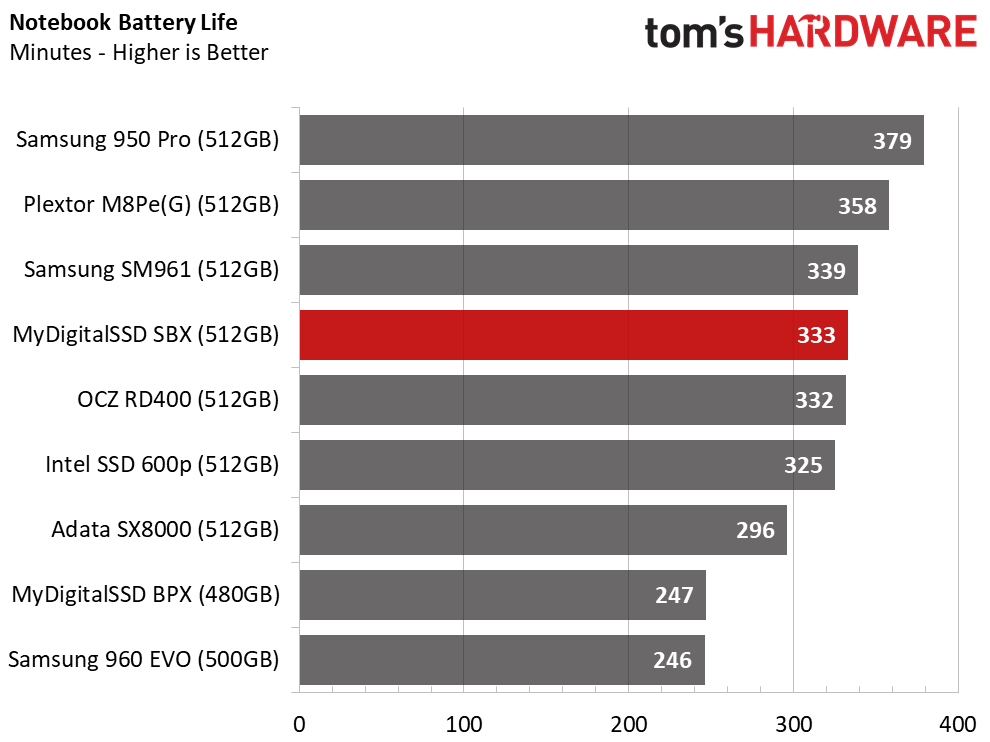
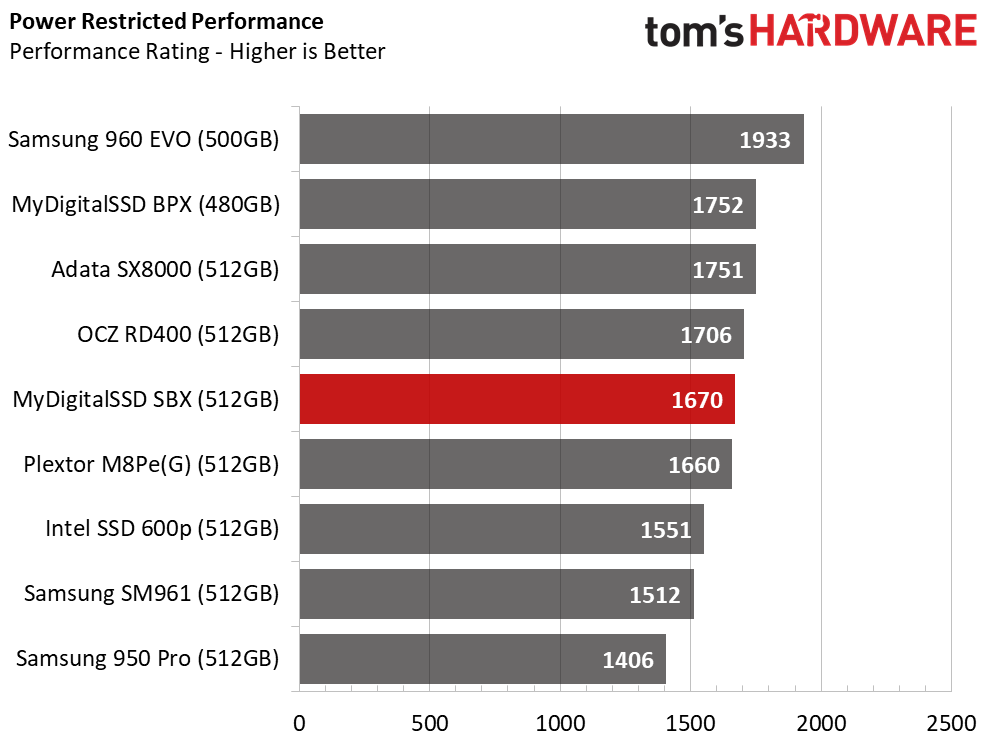
Our Lenovo Y700-17 gaming system ran for 333 minutes on battery power. That's much better than we measured with the aging BPX series. Phison hasn't fully optimized the E8 controller for enhanced low power states, and the BPX's latest firmware update didn't come with the advanced power features.
MORE: Best SSDs
MORE: How We Test HDDs And SSDs
MORE: All SSD Content
Current page: 512GB Benchmark Results
Prev Page 1TB Benchmark Results Next Page 256GB And 128GB Benchmark Results
Chris Ramseyer was a senior contributing editor for Tom's Hardware. He tested and reviewed consumer storage.
-
2Be_or_Not2Be Nice review! There are always products that could have been included, like the Intel 760p.Reply
Yeah.... based on the performance & overall picture - it's a "pass" for me. I'd stick with the BPX or the other higher performing NVMe drives. -
Brian_R170 Totally agree on the Intel 760p missing from the comparisons. Curiously enough, if you go look at the 512MB 760p review from a few weeks ago, the MyDigitalSSD SBX is included on a couple of the Bapco graphs, yet the 760p is completely missing from this review. The 512GB 760p appears to be a much better performing product all around and especially at low queue depths, but with a very similar price.Reply -
CRamseyer Reply20734629 said:MyDigitalSSD is the first out of the gate with a retail Phison E80-powered SSD. The SBX is the entry-level successor to the popular BPX and brings more performance to the table.
MyDigitalSSD SBX NVMe SSD Review : Read more
CES played games with our release schedule and the 760p wasn't available when we wrote this one. Going forward both drives will be in the low-cost NVMe charts. -
Kennyy Evony Other drives are not included because this is a paid advertisement by mydigitalssd and they want to make you forget about competition.Reply -
CRamseyer Wait, I thought it was only Intel that paid off Tom's Hardware?Reply
We dropped the ball here but not because we were paid, loyalty to a company or anything nefarious.
I'm dealing with this issue right now in another article that covers RAID. I have to write one today but I can't include another product that is under NDA and coming in a couple of weeks. One article has a NDA date and the other doesn't. Ideally, the non-NDA review will come out first but something may come up, like other NDA reviews in other categories. It happens sometimes.
If you look back at the timing, we had the two CPU vulnerabilities and every project came to a standstill to figure out your exposure. What was the number one reported performance issue in the early news cycle? Storage performance. Sprinkle in CES and it was a perfect storm that we rarely encounter.
-
daglesj The ADATA SX6000 128GB NVMe will push 680MBps Seq Writes and will probably be cheaper.Reply -
ev3rm0r3 For that price point, why.... my 2 year old 961 still lays this down without thinking about it. Call me not impressed with new drives and their price tags.Reply -
jpe1701 I just picked one up for a game drive. They are down to sata prices over on mydigitaldiscount. I have a pm961 for my os and app drive so I didn't need anything that fast for my second slot.Reply
